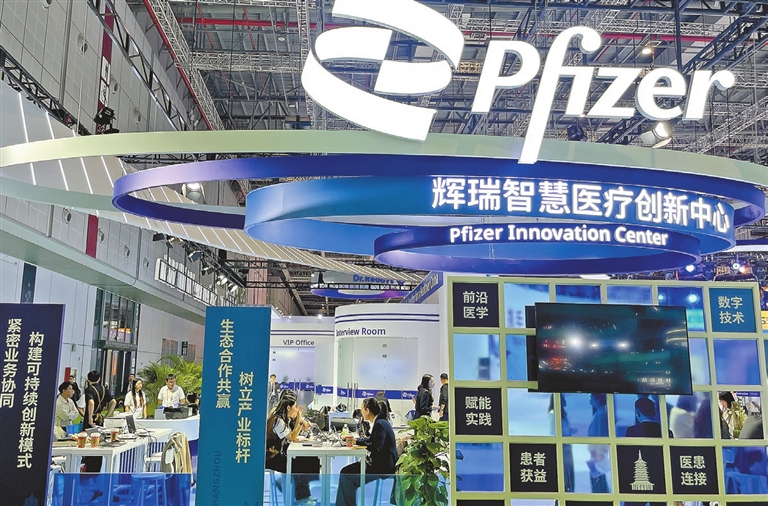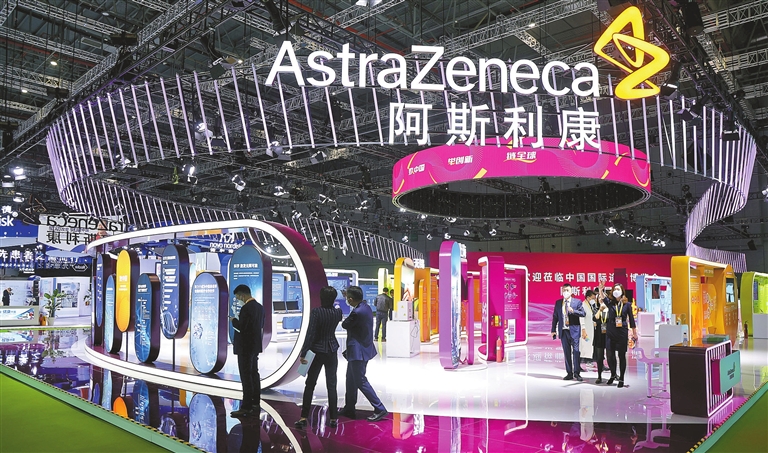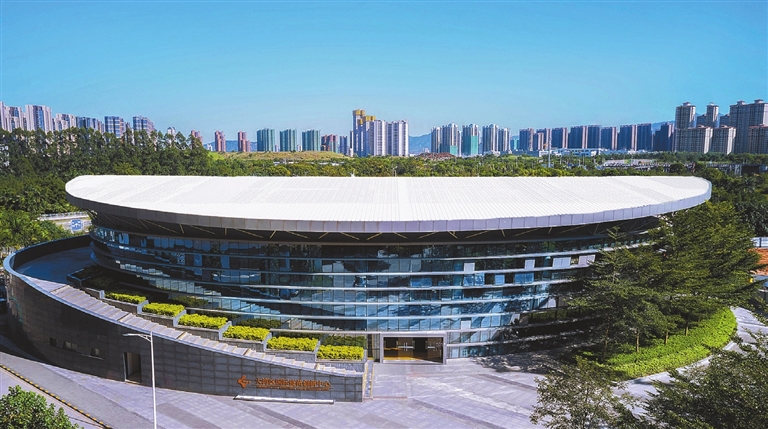



MULTINATIONAL pharmaceutical firms, particularly U.S. giants, are increasingly recognizing China’s burgeoning innovative drug sector as a strategic goldmine to bolster their global competitiveness. Lilly’s newly-opened Lilly Gateway Labs in Beijing has recently welcomed its first tenant, a Chinese biotechnology company focusing on innovative medicines for neurodegenerative and neurological disorders. This marked the launch of Lilly’s first shared lab platform outside the United States, said David A. Ricks, chairman and CEO of Eli Lilly and Co. “China’s biopharmaceutical innovation is accelerating at an unprecedented pace,” he noted. A magnet for global pharmaceutical giants China’s vast healthcare market has long been a magnet for global pharmaceutical giants. Notably, the country’s robust biotechnology creativity is now emerging as a more compelling draw for foreign capital. On Saturday, U.S. pharmaceutical giant Pfizer opened its first Beijing-based entity, a research and development (R&D) center, at BioPark in the Beijing Economic-Technological Development Area (BDA). As the company’s third R&D center in China, the new facility aims to enhance its existing drug development network in the country, integrating China into Pfizer’s global early-stage clinical trials and all pivotal phase III studies. Medical tech firm Medtronic has also opted for tapping into China’s biotech advancements. Last week, it launched a digital healthcare innovation base at BioPark in the BDA — its first in China. The new facility plans to leverage China’s medical resources and innovation momentum to develop disease management solutions based on artificial intelligence and big data. To date, nearly 5,000 medical and healthcare companies have gathered in the BDA. British pharma AstraZeneca joined the bandwagon by signing a landmark agreement earlier this month to invest US$2.5 billion in Beijing over the next five years, demonstrating confidence in China's life sciences innovation ecosystem. Under the agreement, AstraZeneca will establish a global strategic R&D center in Beijing, its sixth worldwide and second in China after one in Shanghai. The new center, equipped with an advanced artificial intelligence and data science laboratory, will accelerate early-stage drug research and clinical development. To date, nearly 5,000 medical and healthcare companies have gathered in the BDA, including multinational pharmaceutical giants such as Eli Lilly, Pfizer, Bayer, AstraZeneca, and Medtronic. “China’s biotechnology sector thrives on a dual engine — Beijing’s constellation of famous medical universities training great minds and biotechnology, coupled with an environment that’s cultivating new company formation,” said Ricks from Lilly. Lilly’s lab platform is designed to accommodate five to eight biotech companies. Ricks confirmed plans to establish additional facilities in Shanghai and other innovation hubs in the country. “We have hit the optimal moment to develop innovative drugs,” said Guan Xiaoming, co-founder of 4B technologies, a Chinese biotech company that has joined Lilly’s Beijing incubator. Huzur Devletsah, president and general manager of Lilly China, said, “China’s biopharmaceutical market is rapidly evolving, with significant growth and a strong focus on innovation.” In addition to its huge investment, AstraZeneca, which has been deeply rooted in China for over 30 years, will form a new joint venture with Shenzhen Kangtai Biological Products Co. to develop, manufacture, and commercialize innovative medicines targeting respiratory and other infectious diseases. “China is a global leader in innovation in the biopharmaceutical industry,” said AstraZeneca CEO Pascal Soriot, noting that the strong signals from this year’s government report that reaffirm the country’s commitment to science, innovation, and opening up are “highly encouraging.” “We have been investing in science and innovation for many years in China,” he said. “And we plan to invest even more in the future.” French pharmaceutical giant Sanofi also reaffirmed global investor confidence in the Chinese market by announcing in December that it was investing nearly 1 billion euros (US$1.04 billion) to build a new insulin production base in Beijing — the company’s largest single investment in China since 1982. Sanofi previously signed a partnership agreement with Shenzhen’s Pingshan district government to introduce more innovative products to satisfy the upgraded disease prevention needs of Chinese populations. Shenzhen is home to Sanofi’s Greater Bay Area International Vaccine Innovation Center and its flu vaccine production plant, the first and only foreign-owned vaccine production site in China. Growing demand With China’s population aging, the demand for innovative drugs and vaccines is expected to grow, said Michael Corbo, senior vice president of Pfizer. He added that its new R&D center in Beijing aims to accelerate the global simultaneous development of innovative drugs, benefiting patients worldwide, including those in China. In a swift response to growing demand, Lilly on Saturday launched Kisunla (donanemab) in China, an innovative treatment that can significantly slow the disease progression in early stages of Alzheimer’s disease by targeting the pathological mechanism. Kisunla was approved as a Class One Innovative Drug by China’s National Medical Products Administration (NMPA) in December 2024. “As the population continues to age, the Chinese Government is taking active steps to strengthen the prevention and management of Alzheimer’s disease,” said Devletsah. “Lilly’s Kisunla brings new hope to patients by offering a treatment that targets the underlying pathology of the disease, helping to ease the societal burden of aging.” China has recently issued a guideline on comprehensively deepening the reform of drug and medical device regulations to promote the high-quality development of the pharmaceutical industry. The guideline outlines 24 reform measures across five key areas, which are increasing support for innovation in R&D, improving review and approval efficiency, enhancing the compliance level of the pharmaceutical industry via efficient and strict supervision, expanding opening up and cooperation, and fostering a regulatory system that meets the needs of industrial development and safety. In 2024, China approved the market entry of 48 innovative drugs and 65 innovative medical devices. Its number of drugs in development ranked second globally, and several domestically developed drugs gained approval for global markets. Biotech boom China’s growing appeal for international pharmaceutical giants stems partly from the remarkable global market performance of its homegrown innovative drugs. Akeso Inc., a startup based in Zhongshan, Guangdong Province, saw its license-out lung cancer drug outperform blockbuster therapy Keytruda of MSD, known as Merck in the United States, in a head-to-head trial. A Wall Street Journal columnist described it as the DeepSeek moment for China’s biotech industry, albeit in a more “incremental” fashion. “China has made notable progress in pharmaceutical innovation, both in terms of quantity and quality,” said Xia Yu, Akeso’s founder. “This has boosted its international standing and competitiveness.” Currently, an increasing number of Chinese biotech firms are relying on well-trained domestic researchers to quickly advance lab findings to clinical stages. Many such fast-moving startups are choosing to license their innovations to global giants or partner with them in a bid to explore overseas markets. Last week, Hengrui, a major pharmaceutical company located in the eastern Chinese city of Lianyungang, inked an exclusive licensing agreement with MSD for a clinical-stage oral coronary heart disease drug. Hengrui will receive a US$200-million upfront payment from the global firm headquartered in New Jersey, U.S., and is eligible for up to US$1.77 billion in milestones and royalties on net sales if the product is approved. Another recent development saw Avenzo Therapeutics, a California-based firm, entering into a license contract in January with Shanghai’s DualityBio to develop next-generation antibody-drug conjugate (ADC) cancer therapies. “DualityBio has a strong track record of developing and advancing a pipeline of differentiated ADCs that target a broad range of indications,” said Athena Countouriotis, co-founder, president, and CEO of Avenzo Therapeutics, in a statement. The first-in-human clinical study of an ADC candidate drug is anticipated to take place this year. Such business collaboration has become a standard practice in the industry. Statistics show that in 2025 alone, about 20 Chinese innovative drug license-out deals worth over US$11 billion have been struck. Bi Jingquan, an economist from the China Center for International Economic Exchanges, said an ecosystem that encourages innovative drug discovery is taking shape in China. “China boasts abundant and well-educated human resources, rich clinical research resources, and a drug review and approval system that is largely aligned with international standards,” Bi noted. “If you’re looking for innovation, that’s the logical place to go,” Robert Duggan, founder of Summit Therapeutics, which is Akeso’s U.S. partner, was quoted as saying about China. (SD-Xinhua) | 
